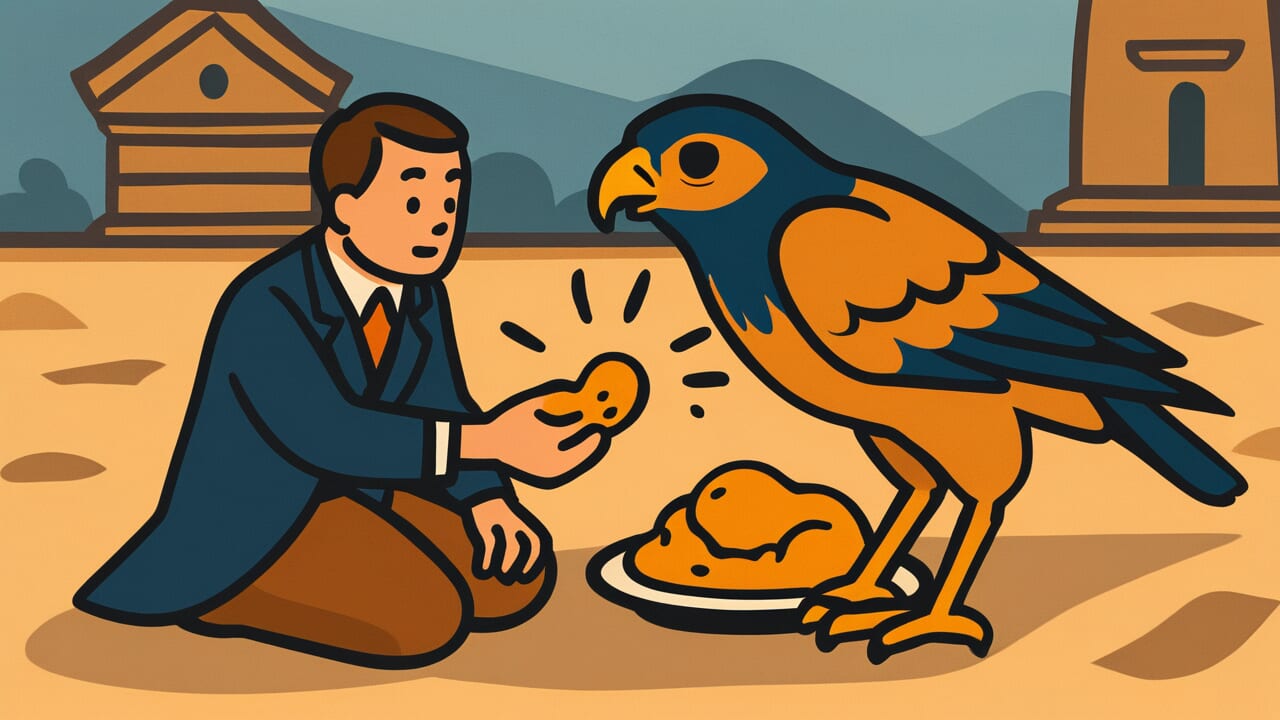How to Read “The hawk breaks its bones, and the master gets the prey”
Taka hone otte danna no ejiki
Meaning of “The hawk breaks its bones, and the master gets the prey”
“The hawk breaks its bones, and the master gets the prey” means that even when you work hard for someone else, the results and benefits don’t come back to you. Instead, they end up belonging to someone else.
This proverb describes situations where someone else receives the benefits of your hard work and achievements. It applies when a boss takes credit for a subordinate’s success at work. It also fits when you help someone with dedication but end up feeling used rather than appreciated.
These unfair situations are still common today. Many people have experienced their efforts not being properly recognized or their contributions going unacknowledged.
This proverb continues to be used as a way to express the emptiness of unrewarded effort.
Origin and Etymology
No clear written records explain the origin of this proverb. However, the structure of the phrase reveals an interesting background.
Hawks were symbolic creatures of the samurai class during the Edo period. Falconry was an exclusive pastime for shoguns and feudal lords. There were even specialized professionals called falconers who trained and cared for these birds.
Hawks were treated as noble birds. Raising them required enormous effort and expense.
“Breaking one’s bones” is an expression meaning to work extremely hard. Falconers trained hawks and cared for them daily to make them useful for hunting.
However, the prey caught by hawks never belonged to the falconers. Everything became the property of the “master,” the owner of the hawk.
This structure suggests the proverb emerged from the master-servant relationships of the Edo period. It reflected the position of servants and workers.
No matter how hard they worked, the results never became theirs. Everything belonged to the master.
This unreasonable situation was expressed through the relationship between hawks and falconers.
The phrase contains the social structure of that time and the complex feelings of the people who worked within it.
Usage Examples
- I worked so hard to make the project successful, but it was “the hawk breaks its bones, and the master gets the prey”—only the department head got a better evaluation
- The volunteer project I helped with was a huge success, but it was “the hawk breaks its bones, and the master gets the prey”—only the organizer got recognized
Universal Wisdom
“The hawk breaks its bones, and the master gets the prey” reveals the essential nature of power relationships in human society.
Why was this proverb created, and why is it still passed down today?
The answer is simple. The problem of imbalance between effort and reward continues to exist across all eras.
Everyone wants their efforts to be fairly evaluated. However, in reality, differences in position and power sometimes mean that the person who works hard and the person who benefits are not the same.
This unfairness is a structural problem in human society. It has repeated itself from ancient times to the present, changing forms but never disappearing.
What’s interesting is that this proverb contains more than just complaints. It includes a calm, observational perspective.
Our ancestors recognized that such unfairness exists in society. They left it behind as words.
This is also wisdom for facing the gap between ideals and reality.
At the same time, this proverb carries a warning. It offers a critical view of structures that exploit people’s goodwill and effort.
It expresses the frustration of those forced into unrewarded labor. It also warns those who take others’ efforts for granted.
Both perspectives are condensed into this short phrase.
What does fairness in human relationships really mean? This proverb continues to ask us that question.
When AI Hears This
Hawks are apex predators high in the ecosystem pyramid. But when one variable changes—a broken bone—they suddenly fall near the bottom of that pyramid.
This shows that their “niche breadth” in ecology is actually much narrower than it appears.
A healthy hawk’s realized niche is “aerial predator hunting small animals.” The moment it breaks a bone, this changes to “small ground-dwelling bird,” a completely different niche.
What’s notable is that the hawk’s sharp talons, vision, and intelligence remain unchanged. Yet the loss of flight alone collapses its ecological position.
In other words, apex predator status doesn’t depend on combined abilities. It depends entirely on one critical ability.
This resembles the concept of “keystone traits” in ecology. Like a keystone removed from an arch causes the whole structure to collapse, flight is the keystone of hawk survival.
Interestingly, the human master can make the hawk prey because humans possess “tool use,” an ability from a different dimension entirely.
A flightless hawk and a human are no longer competing on the same playing field.
This structure is surprisingly similar to modern careers that depend on a single specialized skill. When one ability becomes unusable, other abilities cannot compensate. That vulnerability exists there.
Lessons for Today
What this proverb teaches you today is the importance of always being aware of where your efforts are directed.
Of course, this doesn’t mean you should demand returns for every action. However, if a relationship continues where your contributions aren’t properly recognized, that’s not a healthy relationship.
You have the right to choose an environment where your efforts are rewarded.
At the same time, this proverb is a warning for those in positions of power. If you’re in a position to benefit from someone else’s efforts, don’t forget to acknowledge their contributions and express gratitude.
Taking people’s efforts for granted will surely destroy trust.
What’s important is not accepting the situation this proverb describes as “unavoidable.” Unfair structures can potentially be changed by speaking up.
It’s also important to remain humble so you don’t become someone who exploits others’ efforts.
Building relationships where effort is rewarded starts with your own choices and actions.



Comments